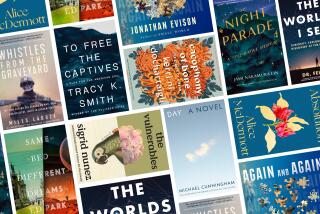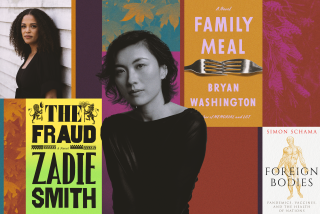COVID and ignorance and zombies: Horror about the not-quite-everyday
- Share via
An infectious virus is crippling communities across the Northeast. Hospitals are overrun, there’s not enough PPE, and the disinformation spreading on social media is sowing confusion and making matters worse.
This isn’t the novel coronavirus diaries; it’s “Survivor Song,” Paul Tremblay’s gripping new novel of horror and suspense about an exceptionally nasty and completely fictional pandemic.
Tremblay, whose accolades include the Bram Stoker Award, is a rising star in the horror genre. He started out as a writer of short stories and crime fiction but transitioned to horror in the 2015 novel “Head Full of Ghosts,” which made Stephen King a fan. Since then he’s published three additional novels and a story collection.
“Survivor Song” demonstrates Tremblay’s knack for psychological horror, a subgenre that tends to take unusual situations to the outer limits of credulity without crossing over into the supernatural, plumbing the terror and trauma of the not-quite everyday.
“I tried to take on a trope of horror, tweak it and ground it in reality,” Tremblay said from his home outside Boston, where he’s a high school math teacher. Tremblay started writing “Survivor Song” in summer 2018 and turned in final edits last fall, shortly before reports started to circulate of a highly infectious novel coronavirus.
Tremblay’s imaginary virus makes COVID-19 look like the sniffles. Transmitted through a bite from an infected mammal — just like rabies — it’s far more virulent. Once passed along, it takes the virus only an hour to transform its victims into rabid beasts, which is bad news for the infected and anyone in their proximity.
Humans lose their ability to speak coherently, and their motor functions deteriorate, essentially turning them into zombie-like creatures. If the afflicted bring to mind several kinds of mythical monsters at once, the author attributes that to the broad influence of a single disease on supernatural tropes.
“I think humanity’s struggles with rabies through the centuries have led to most of the human monsters we’ve created in folklore and myth,” Tremblay said. “It’s really horrifying what it does to the body when someone is fully infected.”
A character-driven virus saga with shades of a zombie thriller, “Survivor Song” centers on two women: Dr. Ramola “Rams” Sherman, a pediatrician at a small local hospital, and Natalie, her closest friend from college. After a brutal encounter with an infected stranger, Natalie goes to Ramola for help.
Complications abound. The hospital is swarmed with people who have been exposed. Armed militiamen prowl the streets. Infected creatures keep crashing out of the woods. And Natalie is 8 1/2 months’ pregnant.
“I wanted to try to make the story a little bit smaller and more personal,” Tremblay said. “I didn’t want to focus on the CDC and the government response. I wanted to focus on a small local hospital’s response to something like this. What would that be like?”
Tremblay consulted with his sister, Erin, a healthcare professional in Boston. Drawing on her experience preparing for the Ebola virus in 2014, he was able to map out how the virus would spread — and how humans would respond.
“[I]f we can maintain a proper quarantine and isolation,” one of the doctors says to Ramola, “we should be able to contain the outbreak. But that presumes people do not panic, that correct information and instruction are disseminated efficiently to the public, that the federal government follows the CDC’s recommendation to be proactive with the vaccine and not reactive.”
In other words: Uh-oh.
There is even a posse of right-wing militiamen with bizarre ideas about the origins of the virus. “When I was writing it,” Tremblay said, “I thought, ‘I wonder if that’s gonna seem realistic to anybody?’ If anything, I probably should have given them more outlandish beliefs, based on some of the reactions to the coronavirus.”
There’s plenty of fodder for conspiracy theories in a virus that infects bats, coyotes, dogs and humans. Although its origin is never explained, “Survivor Song” isn’t a mystery; it’s a thinking person’s thriller, interspersed with moments of hilarity. It’s also formally inventive. Tremblay toggles between Ramola’s and Natalie’s perspectives and occasionally breaks the narrative to tell the story in other modes (there’s a prelude, an interlude and a postlude). Fans of Tremblay’s earlier novels will be rewarded with the return of a pair of characters — Josh and Luis — from “Disappearance at Devil’s Rock.”
None of which is to say that the plot ever really slows down. It’s a buzz saw of a novel, spanning just six hours of the worst day of his characters’ lives, which Tremblay compares to a punk performance.
“I was thinking of my favorite songs,” he said of the book’s title, “many of which are really short and aggressive … In a punk song, there’s a truth revealed, right? It’s usually a terrible truth, just like in a horror story.”
Tremblay admires the intensity and compression of short, fast songs that pack a punch. Punk music and horror stories are often dismissed as formulaic, but Tremblay enjoys the challenge of finding inventive ways to express terrible truths. “I’m a huge music fan, and at heart, I’m a frustrated musician. I tried writing music before I tried writing fiction, so I come back to music for inspiration quite frequently.”
Did the creation of the imaginary virus leave Tremblay better prepared for the real one? “First, I would certainly never say that I’m a virus expert,” he said. “I knew enough to write a story of a very fictionalized virus. I teach at a high school and it happened to coincide with my spring break. I spent those first two weeks at home watching ‘Animal Planet.’”
So goes another hard truth: When the zombie apocalypse hits, the zombie apocalypse experts will be freaking out with the rest of us.
Ruland’s book “Do What You Want” with Bad Religion will be published in August.
Survivor Song
Paul Tremblay
William Morrow: 320 pages, $28
More to Read
Sign up for our Book Club newsletter
Get the latest news, events and more from the Los Angeles Times Book Club, and help us get L.A. reading and talking.
You may occasionally receive promotional content from the Los Angeles Times.






